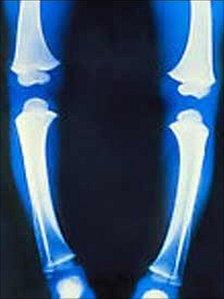Increase in rickets in Southampton astonishes doctors
- Published

Coloured X-Ray of the legs of a child with rickets
More than 20% of children tested for bone problems in Southampton showed signs of the crippling disease rickets, a health trust has revealed.
Consultant orthopaedic surgeon Prof Nicholas Clarke checked more than 200 of the city's children for bone problems caused by a lack of vitamin D.
He was astonished by the results, which, he said, were "very reminiscent of 17th Century England".
The disease can lead to deformities like bowed legs as well stunted growth.
Prof Clarke, based at Southampton General Hospital, said vitamin D supplements should be more widely adopted to halt the rise in cases.
The Department of Health said it would review the evidence.
'Middle class and leafy'
A lack of vitamin D can be caused by poor diets and insufficient exposure to sunlight, which helps the body synthesise the vitamin.
"A lot of the children we have seen have got low vitamin D and require treatment," he said.
"In my 22 years at Southampton General Hospital, this is a completely new occurrence in the south that has evolved over the last 12 to 24 months and we are seeing cases across the board, from areas of deprivation up to the middle classes.

Prof Clarke said vitamin D supplements should be more widely adopted to halt the rise in cases
"There is a real need to get national attention focused on the dangers this presents."
He added that the "modern lifestyle, which involves a lack of exposure to sunlight, but also covering up in sunshine" had contributed to the problem.
"The return of rickets in northern parts of the UK came as a surprise, despite the colder climate and lower levels of sunshine in the north, but what has developed in Southampton is quite astonishing," said Prof Clarke.
"We are facing the daunting prospect of an area like Southampton, where it is high income, middle class and leafy in its surroundings, seeing increasing numbers of children with rickets, which would have been inconceivable only a year or so ago."
Since the 1940s, it has been mandatory for all margarines, sold for domestic use in the UK, to be fortified with Vitamin D.
A Department of Health spokesman said the Scientific Advisory Committee on Nutrition was due to review the evidence on Vitamin D, including options to improve its intake.
"The Government will consider the recommendations by the committee carefully," he said.